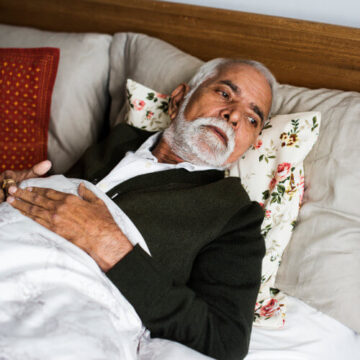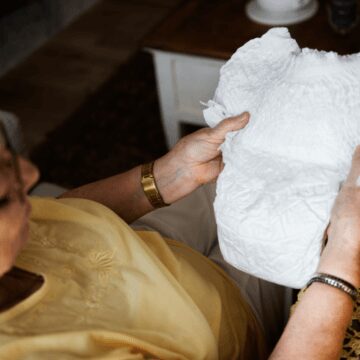
Receiving an incontinence diagnosis can trigger many emotions and feelings. And if you leave these emotions unchecked it can have a significant impact, not only on your quality of life but also on your mental health. In this article, we will look at how incontinence can impact your psychological well being for you as the sufferer, as well as the caregiver.
How Incontinence Affects Your Psychological Well-being
It is important that you know and understand that grieving is part of this journey. Be patient and take time to grieve the changes that have occurred to your body and life. Or in the case of a caregiver, you might feel like it’s just too much responsibility to take on. There may be moments of denial, anger, frustration and sadness before you reach a state of acceptance. That state of acceptance may take some time, but going through this process is necessary and absolutely normal.
Let’s look at the mental effects:
1. A Myriad of Emotions
Outside of embarrassment and shame, the fear of being wet and then being discovered, especially in public, can be emotionally taxing. As a caregiver, you may feel a sense of impatience, frustration and even annoyance with the person you are caring for.
How you can cope:
It’s important for you to find someone you can talk to about your feelings. Consider confiding in someone, perhaps your doctor, a counsellor, or maybe an incontinence support group. But keeping these feelings inside can only lead to further stress. Furthermore, admitting and talking about these emotions openly and honestly will help lift the weight and even normalize the situation for both of you.
2. Anxiety and Isolation
Incontinence can often lead you to avoid activities that you previously enjoyed. You might decline social invitations, or avoid travelling completely, terrified at the thought that there won’t be a bathroom nearby. The anxiety of trying to find one in a strange place or needing help from someone else if your caregiver is not with you may prevent you from leaving the house at all. Constantly thinking about these things can truly be disheartening and cause you to isolate yourself. Unfortunately, isolation only aggravates the situation and can lead to depression as well as an increased risk for other illnesses.
How you can cope:
Always have additional protection with you, whether it’s adult nappies or pull-ups, an extra set of underwear, or both, give yourself confidence knowing that you have security on hand. This way you will know that whatever happens it can be dealt with. Let friends and family know that you may have to stop frequently to use the bathroom. This allows everyone to plan accordingly, including your caregiver. The key to a successful outing is preparation, good communication and a healthy dose of vulnerability. Being vulnerable allows you to accept and embrace your new life while creating authentic connections with those around you.
3. Loss of Independence
The bathroom is the ultimate place of privacy. We can close the door to the bathroom so that no one invades our space when we are there. But, when you have to have someone come with you, you might feel as though you are losing your independence completely.
How you can cope:
Create open and honest dialogue, between yourself and your caregiver. Think about what you find to be the hardest part of needing help and talk to your caregiver or others sharing your home about how this feels for you, and see what can be done to make it more comfortable for those directly affected. Remember this is just as difficult for your caregiver and the only way around this is to talk through the tough situations.
4. Burnout
Incontinence can make your job as a caregiver very hard in many ways. Personal care for your loved one can take up a lot of time, you may find yourself growing less patient and more frustrated. These feelings are only compounded if cleaning and bathing needs take place throughout the night. This might leave you feeling physically and mentally exhausted, overwhelmed and maybe even resentful at being unable to meet the constant demands.
How you can cope: Consider hiring help as this can take some of the strain off you as the caregiver. Join either in person or an online caregiver support group. And be sure to make it a priority to take time for yourself. Remember that taking care of your own needs is vital to enable you to care for someone else.
5. Sleep Disruption
There are many ways in which incontinence can affect and inconvenience your sleep. For one, it causes you to wake up, which often leads to a prolonged sleep disruption while you either clean yourself up or your caregiver helps you to clean up. This inevitably means no sleep for both of you. In addition to that, it can often be difficult to fall back asleep after this interruption. The disruption in your sleep creates a knock-on effect, causing you to feel anxious around bedtime, which can make it even more difficult to fall asleep, leaving you feeling drained and exhausted. Not only that, sleep deprivation can exacerbate any pre-existing mental health conditions you may already have, such as depression or anxiety.
How you can cope:
There are many different incontinence products available, that you can wear at night, such as protective underwear and adult nappies or pull-ups. Wearing these at night will ensure that your sheets stay dry and are protected. Consider also getting water-proof bedding, this will give you peace of mind and make dealing with nighttime incontinence so much easier.
You Always Have Options & Solutions
Clearly, there is a strong link between incontinence and the impact it has on one’s mental health, this cannot be denied. However, the good news is that there are effective products that you can use to manage incontinence, allowing you to live confidently and without fear.
We want to hear from you. Do you or a loved one suffer from incontinence, or are you are perhaps a caregiver? Tell us how this condition has affected your mental health.
Our Adult Range have great solutions to assist with Incontinence. Buy Adult Nappies from only R70 per pack or purchase Adult pull-ups from only R75 per pack if you prefer. We also stock a range of wet wipes and tissues and Bendliners and Linen Savers for your convinence.
Recommended Articles:
To help you on your journey, we recommend the following articles relating to adult incontinence:







